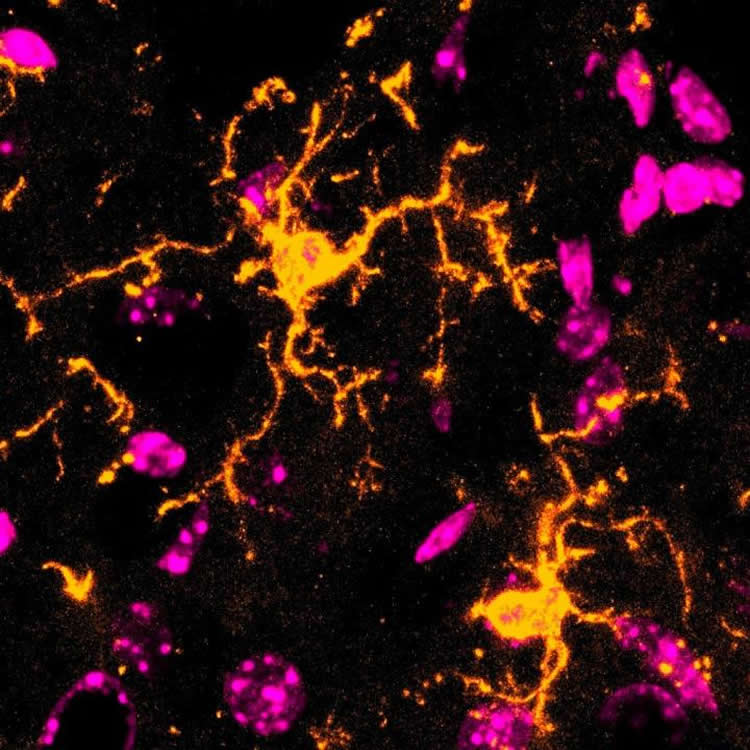Summary: A new study sheds light into the function of microglia and inflammatory response.
Source: Luxembourg Institute of Health.
The NorLux Neuro-Oncology Laboratory at LIH’s Department of Oncology conducts research on brain diseases, with a special emphasis on glioma biology, drug resistance and systems approaches. Within this research unit, Dr. Alessandro Michelucci focuses on the role of glial cells and inflammatory responses. Jointly with team member Dr. Carole Sousa and collaborating research groups from LIH and the University of Luxembourg, major findings were published in the November 2018 issue of the renowned journal EMBO reports. Featured on the journal cover, their scientific report titled “Single-cell transcriptomics reveals distinct inflammation-induced microglia signatures” stands out as the most read article since its online release in September.
Studying the effect of inflammation
The brain is a unique organ with its own “tailored” immune cells and mechanisms, distinct from those of the rest of the body. The central nervous system (CNS) contains specialized parenchymal-resident phagocytes, termed microglia, that survey and modulate the neural environment and respond against infections, toxins or contaminants thereby promoting neuronal health and ensuring normal brain function. Microglia can sense homeostatic perturbations and coordinate immune responses between the periphery and the CNS. Dysfunctional microglia have been observed in chronic neurological disorders such as Alzheimer’s disease, Parkinson’s disease, multiple sclerosis as well as brain cancer and are thought to worsen their outcome.
The activity of microglia during acute neuro-inflammatory processes as those caused by infection remains largely elusive. Acute inflammation represents the early phase of what could result in chronic inflammation and/or neurodegenerative processes. Therefore, microglial responses at this very early phase of perturbation should provide important insights into the cells’ role and adaptive capacities. The aim of the present study was to uncover the heterogeneity of microglial responses under early acute inflammatory conditions to elucidate potential beneficial signatures of subpopulations that could contribute to resolving inflammation and avoiding to enter into a chronic phase causing disease.
To study the cells’ activation, the researchers from LIH isolated microglia from mice injected with lipopolysaccharide (LPS), a bacterial component mimicking an acute infection and triggering inflammation signals in the brain. The use of this model combined with modern single-cell sequencing and multicolor flow cytometry allowed for an in-depth profiling of microglia activation at the transcriptomics level.
Distinct inflammation-induced signatures revealed
The researchers observed a marked global downregulation of the typical microglial homeostatic signature and simultaneously an up-regulation of genes classically activated by inflammation. ‘When investigating further and comparing to published data, we could show that when being under acute systemic inflammation, microglia presented a highly activated state that is clearly distinct from neurodegenerative disease-associated profiles’, states Dr. Sousa, who performed most of the experimental work.

Importantly, the researchers also noticed unforeseen heterogeneity among the activated cells. They hypothesized that a subset of reactive microglia may be less sensitive to the inflammatory stimulus caused by LPS or partly recovered from the activated state.
‘Our findings reveal that microglia responses in inflammatory conditions are heterogeneous and clearly distinct from the responses described in the context of neurodegenerative diseases’, underlines Dr. Michelucci, who initiated and led the project. ‘We hope that these results obtained from single-cell transcriptomic profiling of microglia under inflammatory conditions will contribute to the establishment of new resources that will clarify the specific responses to brain disorders. This should boost the development of novel therapeutic strategies against CNS diseases with an immunological component.’
Funding: This research work is a major part of Dr. Carole Sousa’s PhD thesis which she successfully defended in March 2018. The project was led by Dr. Alessandro Michelucci, an expert in glial cells and inflammation, and involved a fruitful collaboration with scientists from the Proteome and Genome Research Unit at LIH as well as with teams from the Luxembourg Centre for Systems Biomedicine (LCSB) at the University of Luxembourg, in particular with Dr. Alexander Skupin. The work was essentially supported by an AFR PhD grant to Dr. Carole Sousa from the Luxembourg National Research Fund (FNR) and by funding from “Fondation du Pélican de Mie et Pierre Hippert-Faber”, a foundation under the aegis of “Fondation de Luxembourg”. The research team was supported by further research grants from the FNR and the National Institutes of Health (NIH).
Source: Juliette Pertuy – Luxembourg Institute of Health
Publisher: Organized by NeuroscienceNews.com.
Image Source: NeuroscienceNews.com image is credited to luxembourg Institute of Health.
Original Research: Open access research for “Single‐cell transcriptomics reveals distinct inflammation‐induced microglia signatures” by Carole Sousa, Anna Golebiewska, Suresh K Poovathingal, Tony Kaoma, Yolanda Pires‐Afonso, Silvia Martina, Djalil Coowar, Francisco Azuaje, Alexander Skupin, Rudi Balling, Knut Biber, Simone P Niclou, Alessandro Michelucci in EMBO Reports. Published November 9 2018.
doi:10.15252/embr.201846171
[cbtabs][cbtab title=”MLA”]luxembourg Institute of Health”Microglia React Distinctly During Inflammation.” NeuroscienceNews. NeuroscienceNews, 27 November 2018.
<https://neurosciencenews.com/inflammation-microglia-10258/>.[/cbtab][cbtab title=”APA”]luxembourg Institute of Health(2018, November 27). Microglia React Distinctly During Inflammation. NeuroscienceNews. Retrieved November 27, 2018 from https://neurosciencenews.com/inflammation-microglia-10258/[/cbtab][cbtab title=”Chicago”]luxembourg Institute of Health”Microglia React Distinctly During Inflammation.” https://neurosciencenews.com/inflammation-microglia-10258/ (accessed November 27, 2018).[/cbtab][/cbtabs]
Abstract
Single‐cell transcriptomics reveals distinct inflammation‐induced microglia signatures
Microglia are specialized parenchymal‐resident phagocytes of the central nervous system (CNS) that actively support, defend and modulate the neural environment. Dysfunctional microglial responses are thought to worsen CNS diseases; nevertheless, their impact during neuroinflammatory processes remains largely obscure. Here, using a combination of single‐cell RNA sequencing and multicolour flow cytometry, we comprehensively profile microglia in the brain of lipopolysaccharide (LPS)‐injected mice. By excluding the contribution of other immune CNS‐resident and peripheral cells, we show that microglia isolated from LPS‐injected mice display a global downregulation of their homeostatic signature together with an upregulation of inflammatory genes. Notably, we identify distinct microglial activated profiles under inflammatory conditions, which greatly differ from neurodegenerative disease‐associated profiles. These results provide insights into microglial heterogeneity and establish a resource for the identification of specific phenotypes in CNS disorders, such as neuroinflammatory and neurodegenerative diseases.






